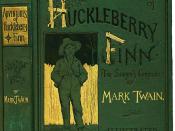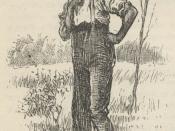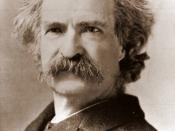The Adventures of Huckleberry Finn, by Mark Twain, is an excellent example of racism in literature, because it uses language describing African Americans which goes beyond satire. It treats them as objects and perpetuates stereotypes. It does not expose and deal with racism, as many advocates of its reading claim, but encourages an attitude of superiority that is unnecessary and intolerable. In order to rid ourselves from this racism, African American literature should be read more often in classrooms throughout the United States. Anything less will simply perpetuate racism.
The American Heritage Dictionary defines racism as 'the belief that some races are inherently better than others.' Mark Twain holds this belief, and his writing illustrates it. The use of the word 'nigger' does not merely serve as a point of satire. He is not simply ridiculing the times by using it, but saying, 'this is how it is.' He conveys the idea that whites are superior to blacks in different ways.
While he might criticize white people's actions, he never lumps them together, attributing similar characteristics to all of them by the use of a term like 'nigger.' By doing this, he is also offending about 15% of the United States population. Every character in the book is racist, even Huckleberry himself. With such lines as: 'Here was this nigger, which I had as good as helped run away, coming right out flatfooted and saying he would steal his children-children that belonged to a man I didn't even know; a man that hadn't ever done me no harm'(Twain, P133), he illustrates this.
Additionally, the character of Jim is not a well-developed character like Huckleberry or even Aunt Sally, but is flat, and is never the instigator of actions. Instead, he is acted upon and is often the center of...


